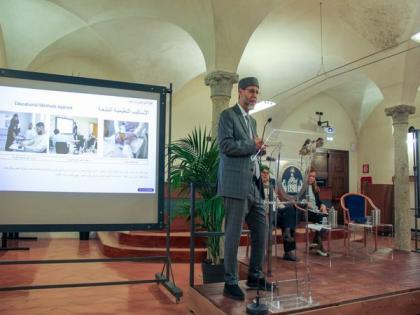SALA showcases Sharjah's initiatives to promote Arabic in West
By ANI | Updated: May 17, 2025 22:42 IST2025-05-17T22:36:05+5:302025-05-17T22:42:51+5:30
Milan [Italy], May 17 (ANI/WAM): As part of the main events marking the opening of the "Arabic Language and ...

SALA showcases Sharjah's initiatives to promote Arabic in West
Milan [Italy], May 17 (ANI/WAM): As part of the main events marking the opening of the "Arabic Language and Culture Festival" in Milan, Italy, organised by the Institute of Arab Culture at the Catholic University of the Sacred Heart and sponsored by the Sharjah Book Authority, the Sharjah Arabic Language Academy (SALA) showcased the emirate's global efforts to support the Arabic language and promote its presence in Western academic circles.
The session highlighted Sharjah's scientific and cultural initiatives to enrich Arabic studies and research at international universities.
During a panel titled "Efforts of the Arabic Language Academy in Sharjah to Support Arabic in the West," Mohamed Safi Al Mosteghanemi, Secretary-General of Arabic Language Academy in Sharjah, emphasised that Arabic, as a bridge for intercultural dialogue, continues to be cherished by its native speakers and passionately studied by Orientalists and scholars in both Asia and Europe. These efforts, he noted, have translated into meaningful contributions that have helped establish Arabic's global standing.
Al Mosteghanemi discussed the "Language Immersion" initiative launched by the Academy under the guidance of Sultan bin Mohammed Al Qasimi, Supreme Council Member and Ruler of Sharjah.
The initiative brings academic delegations from global universities in Austria, Poland, Italy, and others to live among the people of Sharjah and engage with its cultural environment, thereby enhancing their linguistic skills beyond traditional classroom learning.
He also referred to the "Comprehensive Arabic Encyclopaedia" project, overseen by the Academy, stating that such initiatives embody Sharjah's vision of promoting Arabic as a source of knowledge and human connection capable of transmitting ideas and cultures across nations.
He also outlined five key foundations for developing linguistic mastery. First is continuous and mindful reading, which broadens knowledge and strengthens expression. Second is deep engagement with "instrumental sciences" such as grammar, morphology, rhetoric, and prosody, which provide learners with analytical tools. The third key, he noted, is the role of a skilled teacher who can instil a love for Arabic among both native and non-native speakers.
Al Mosteghanemi also stressed the importance of memorisation in Arabic learning, citing Quranic verses, prophetic sayings, classical poetry, and wise proverbs, as a fourth essential element. The fifth and final key is systematic training, both oral and written, through regular sessions that allow learners to use the language in varied real-life situations.
The festival spotlighted the presence of Arabic language and culture in Western contexts, addressing topics such as teaching Arabic to non-native speakers, updating grammar and rhetoric curricula, exploring Arab literature in the diaspora, issues of translation, and how Arabic texts are received in other languages, all tied to broader questions of identity and cultural integration. (ANI/WAM)
Disclaimer: This post has been auto-published from an agency feed without any modifications to the text and has not been reviewed by an editor
Open in app